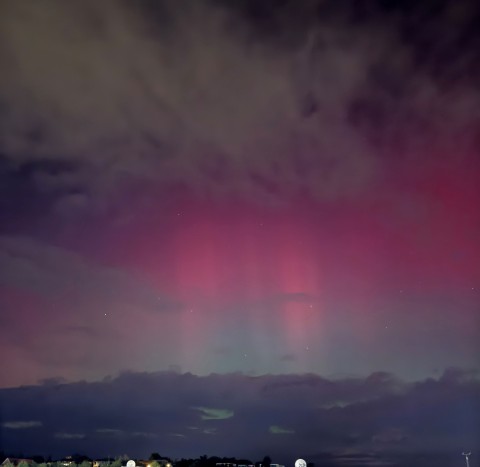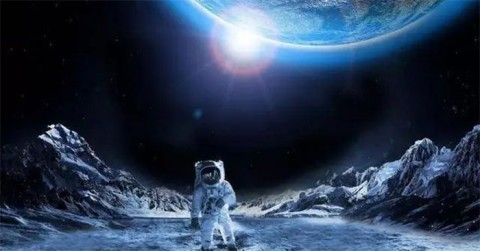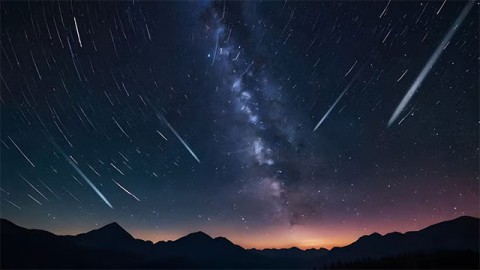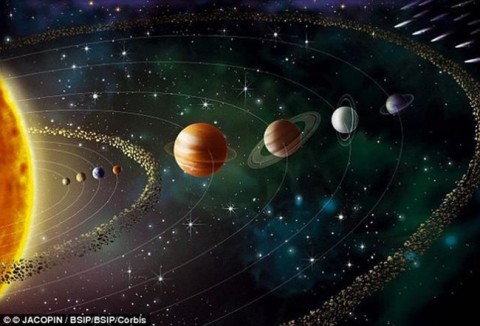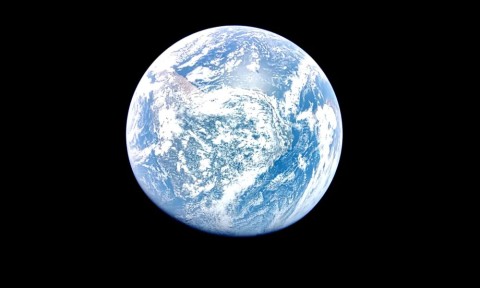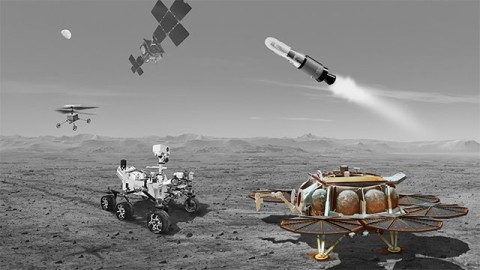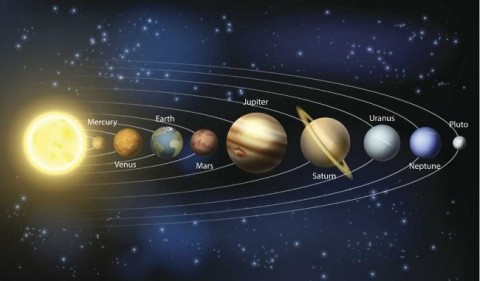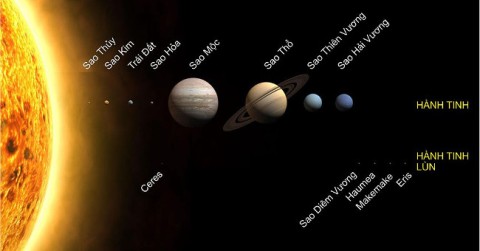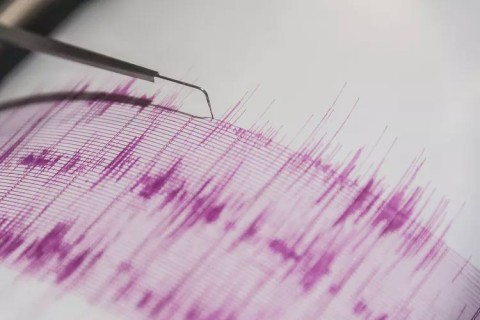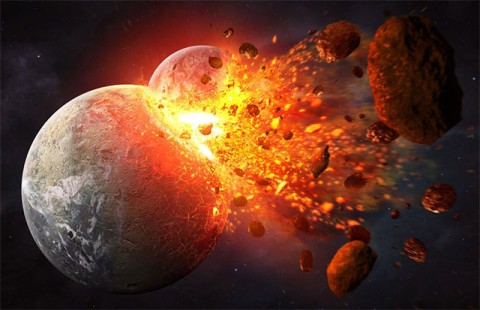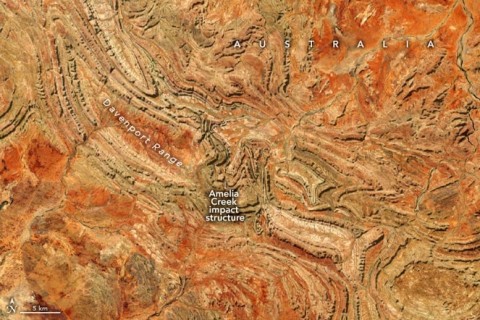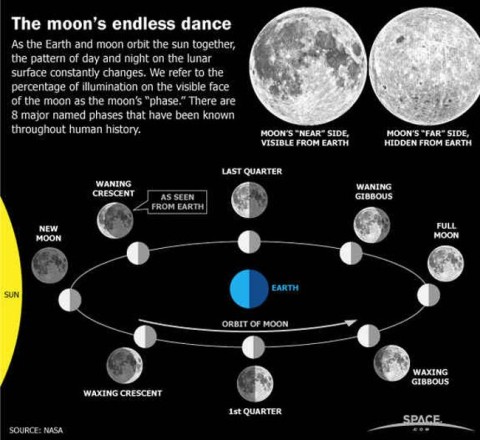What is the distance from Earth to Jupiter - the largest planet in the Solar System?
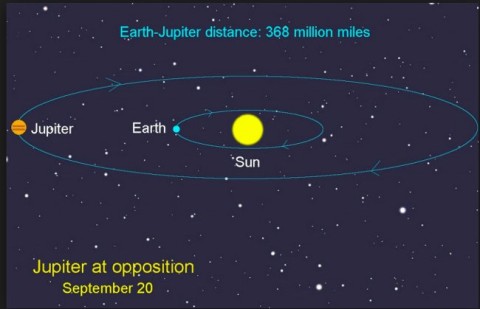
How far is Jupiter from Earth? If you don't know, this article will tell you how far Jupiter is from Earth.
The universe is truly amazing, partly because of its sheer size, but also because of the mysteries that are beyond human imagination. No matter how much we learn about space, there are always new and amazing things to discover. Here are just three of the many facts about the universe that will leave you speechless when you first hear them.
The largest known star is 2,150 times more massive than our Sun.
The Sun is so big compared to Earth that it can warm us from 93 million miles away. In fact, it’s hard to put it into perspective, but scientists estimate that the Sun is 1,287,000 times larger than Earth. The Earth’s diameter is only 7,918 miles, while the Sun’s diameter is 865,000 miles. This is a huge difference, but Sol is actually a relatively small star compared to many others in the universe.
The largest star known to astronomers is Stephenson 2-DFK 1, also known as Stephenson 2-18. It is a red supergiant located in the constellation Scutum, about 18,900 light years from Earth. Stephenson 2-18 is estimated to be about 2,150 times more massive than our Sun. Its diameter is 1,859,750,000 miles, a number so huge that no one can even fathom it.
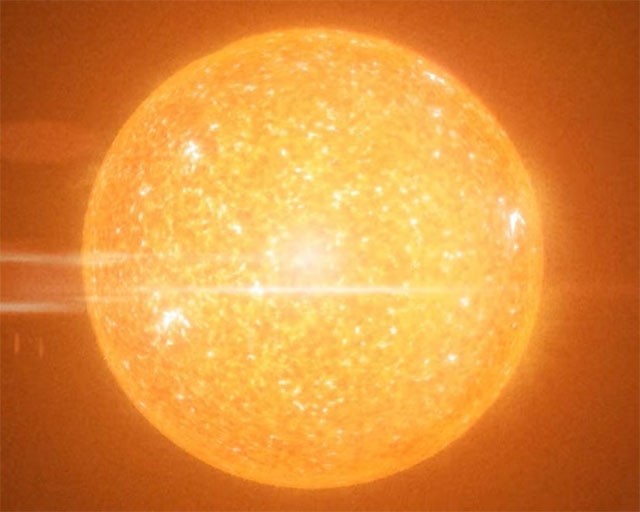
Imagine this: If Stephenson 2-18 were placed in the place of the Sun, its surface would extend to the orbit of Saturn. The star is so big that it would take 9 hours to circle its circumference at the speed of light. By comparison, the Sun takes just 14.5 seconds to circle its circumference. You could fit 10 billion Suns inside Stephenson 2-18. The star is so big that scientists are considering calling it a red supergiant instead of a regular supergiant.
It's important to note, however, that we're observing this giant star from a very distant distance—so much so that our observations and measurements have an uncertainty of up to 50%. All estimates of this star are just that: estimates. Stephenson 2-18 may not be as big as we think, but it's certainly still many times bigger than the Sun, and there are other stars that are thousands of times more massive than the Sun, such as WOH G64 and UY Scuti.
The brightest object in the universe was created by a giant black hole
When you think of bright things in space, you probably don’t think of black holes. After all, black holes absorb light due to their extremely strong gravity, which is why we see them as black. However, the reality is a little more complicated. It’s true that there is a point where a black hole’s gravity is so strong that light can’t escape, so we never see light there. But in an indirect way, black holes also produce light.
Twelve billion light years away is a supermassive black hole called J059-4351. It has a mass about 17 billion times that of the Sun and sits at the center of a galaxy packed with matter. J059-4351’s gravity is so strong that it is estimated to devour the mass of the Sun every day. Needless to say, that’s a lot of matter.
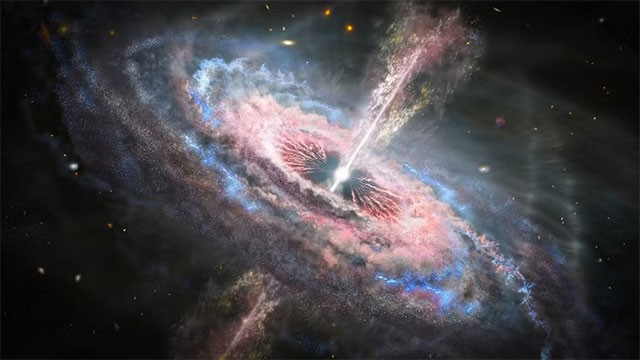
As this matter, be it gas, rock, or even stray molecules, approaches J059-4351’s event horizon, it is accelerated to near the speed of light, creating a tremendous amount of friction. This friction produces all sorts of energy, including radio waves and visible light. That’s why a meteoroid that burns up as it enters Earth’s atmosphere glows. The light released by this process is what makes a black hole’s accretion disk shine so brightly, and it’s also why you can see light around a black hole.
J059-4351 is so massive and sucks in matter at nearly the speed of light that the light it emits is 500 trillion times brighter than the Sun. It’s hard to come up with a fun analogy to help you visualize this. Just know that a trillion has 12 zeros, and we’re talking about 500 times that number.
It may be hard to believe that the brightest object in the universe is just the result of a huge amount of matter being sucked into a giant black hole at lightning speed. But 40% of the mass involved in this process is converted into energy, making it one of the most efficient natural processes in the universe. Compare that to the thermonuclear fusion reaction in the Sun, which converts less than 1% of matter into energy. That’s truly astonishing.
Most of the Solar System's Mass Is Located in the Sun
To us humans, Earth seems huge. It takes forever to travel the circumference of the blue planet. You could dig for miles and still not reach the core. The planet weighs billions of billions of kilograms. Yet it is dwarfed by other planets like Jupiter and Saturn. Our solar system is not very diverse, consisting of just a few planets, moons, and asteroids floating around, and of course the centerpiece is the Sun.
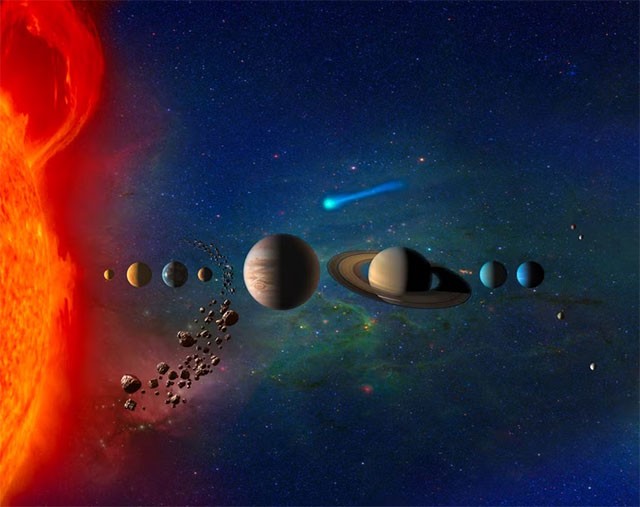
Still, you might be surprised to learn that 98.86% of the mass in the solar system is contained within the sun. All other objects in the solar system, including all the planets, moons, and floating rocks, account for only 1.14% of the remaining mass. Even Earth accounts for only about 0.1% of the solar system's mass.
This shows how big the universe really is. Even if we added up all the other planets in our solar system, Jupiter would still have 2.5 times the mass of all of them combined. But the Sun is nearly 100 times the mass of Jupiter, and there are stars out there that make our Sun look like a mere speck of dust.
How far is Jupiter from Earth? If you don't know, this article will tell you how far Jupiter is from Earth.
The period from October 6 to 13 is an exciting week for the skywatching community, as stunning auroras are visible in many locations around the world.
The time for the Moon to revolve around the Earth is about 27.3 days, while the Earth rotates once around its axis in 24 hours (one day - night).
Several times a year, the deep night sky above us puts on a spectacular show of lights streaking through the darkness.
What does the sun revolve around is a question that many people are interested in. Does the sun rotate? Let's find out together!
It's been a week since Firefly Aerospace's Blue Ghost mission began its journey to the Moon, carrying NASA's scientific instruments and aiming to perform the second commercial soft landing on the planet's surface.
NASA has big goals for Mars. The agency wants to collect the first samples from the Martian surface and return them to Earth in an ambitious mission called Mars Sample Return.
What is the hottest planet in the solar system? If you want to know which is the hottest star in the solar system, this article will give you the answer.
How big is the diameter of the solar system? This article will give you the answer.
Do you know the history of the formation of the Earth? If you do not know the history of the Earth, this article will give you the answer.
The Earth's mantle is the thick layer of hot, solid rock that lies between the Earth's crust and the molten iron core. It makes up the bulk of the Earth, accounting for two-thirds of the planet's mass.
Throughout the history of human astronomical research, one of the most familiar and studied objects is the Moon.
About 600 million years ago, Earth was home to strange, soft-bodied sea creatures. However, a massive asteroid impact in what is now northern Australia may have wiped out this ecosystem.
The full moon is a common astronomical phenomenon that only appears once a month. What is the special meaning of the full moon and when does it appear? Let's find out with Quantrimang.com!
Struggling to locate the Microsoft Teams Installation Folder on your PC? This step-by-step guide reveals exact paths for new and classic Teams, per-user & per-machine installs. Save time troubleshooting!
Struggling with Microsoft Teams Proxy Error? Discover proven Troubleshooting Microsoft Teams "Proxy Error" Settings Fix steps. Clear cache, adjust proxy settings, and get back to seamless calls in minutes with our expert guide.
Tired of Microsoft Teams OneDrive Error blocking file sync? Follow our step-by-step guide to solve Microsoft Teams "OneDrive Error" File Sync issues quickly. Proven fixes for smooth collaboration in Teams channels. Get your files syncing error-free today!
Tired of Microsoft Teams workflows and Power Automate errors halting your productivity? Get step-by-step solutions to common issues like authentication failures, timeouts, and flow errors. Fix them in minutes and automate effortlessly!
Facing Microsoft Teams "Download Error" on MacBook? Discover proven troubleshooting steps to resolve download failures quickly, from cache clears to reinstalls, and get back to smooth teamwork.
Tired of the frustrating Microsoft Teams "Where is Teams" Folder Error? Discover proven, step-by-step troubleshooting fixes to resolve it quickly and restore smooth teamwork. Latest methods included!
Frustrated by Microsoft Teams JavaScript Error on desktop app? Discover proven steps to fix it fast: clear cache, update, reset, and reinstall. Get back to seamless collaboration in minutes!
Struggling with Microsoft Teams "Guest Login" Error? Discover step-by-step fixes, from quick cache clears to admin settings, to resolve guest access issues fast and collaborate seamlessly. Updated with the latest tips!
Tired of the Microsoft Teams "For PC" download error blocking your work? Follow our proven, step-by-step guide to resolve it quickly and get Teams running smoothly on your PC today.
Struggling with Microsoft Teams "Windows 7" login error? Discover step-by-step fixes for this frustrating issue on Windows 10/11. Clear cache, edit registry, and more – get back to seamless collaboration today!
Tired of Microsoft Teams Error Code 0x80070005 blocking your meetings? Follow this 2026 guide with step-by-step fixes for access denied issues. Get Teams running smoothly in minutes!
Master the installation of the Microsoft Teams Add-in for Outlook 2026 effortlessly. Boost your productivity with seamless scheduling and meetings. Follow our proven, up-to-date steps for instant success!
Struggling with Microsoft Teams "License Error" 2026? Discover proven, step-by-step solutions to resolve it fast. Clear cache, check licenses, and get back to seamless collaboration—no IT help needed!
Whether youre in your 50s, 60s, or even 70s, its not too late to prioritize your health and put yourself first. Here are the best exercises for people 50 and older.
Struggling with Microsoft Teams Error Caa50024 on Windows 10/11? Follow our step-by-step fixes to resolve crashes and launch issues quickly. Latest proven solutions for seamless teamwork.
